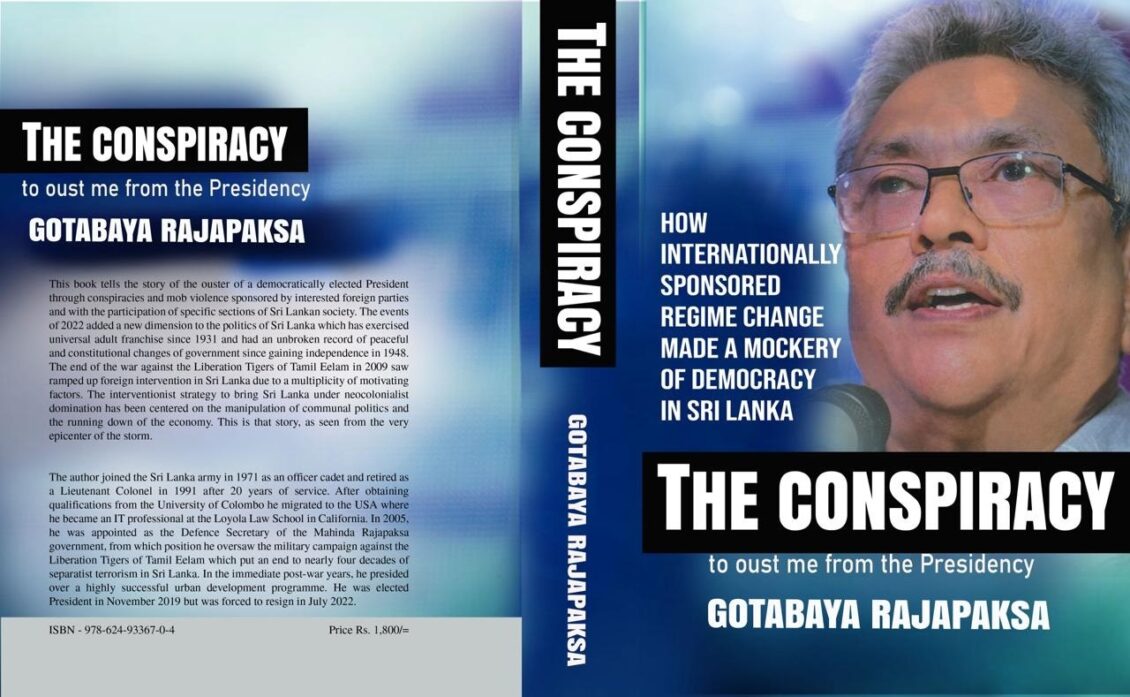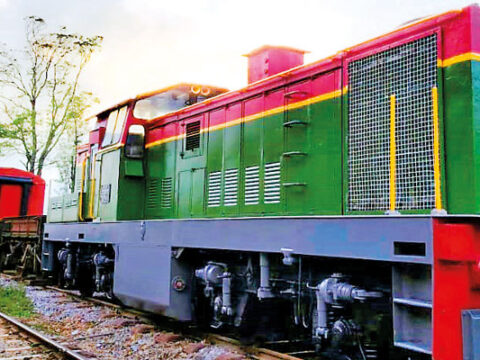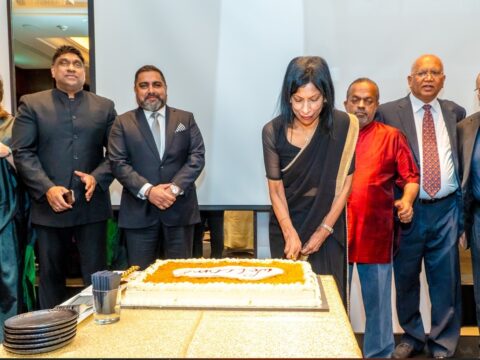COLOMBO: With just months away from elections in Sri Lanka, former president Gotabaya Rajapaksa has claimed that he was ousted from power in 2022 due to an “international conspiracy In a tell-all memoir titled, ‘The Conspiracy To Oust Me from The Presidency’, the former President tells his side of the story and what led to the regime change in Sri Lanka.
In 2022, when the Aragalaya struggle was at its peak, Gotabaya fled the country and later sent in his resignation. He even claimed that his life was in danger. His flight to Maldives and then Singapore was the most tracked by the public in recent history. Later, in a reference to the time he took the decision to resign while in Singapore, Mr. Gotabaya writes that he had, by then, decided Mr. Wickremesinghe would be his successor, “because I saw him as the only person capable of restoring law and order in the country.” On July 20, 2022, Ranil Wickremesinghe was elected President through an urgent parliamentary vote, in which the Rajapaksas’ party, the Sri Lanka Podujana Peramuna (SLPP or People’s Front) backed him. Mr. Gotabaya returned to Sri Lanka in September 2022, after seven weeks in Singapore. He lives in a state bungalow in Colombo with special security accorded to him by the Wickremesinghe administration.
The front cover of the book reads “How internationally sponsored regime change made a mockery of democracy in Sri Lanka. The conspiracy to oust me from the presidency by Gotabaya Rajapaksa,” with an image of the disgraced president. The book’s back cover says what made Gota write the memoir and his early life as a soldier in the Sri Lankan army.The book is available in bookstores in Sri Lanka in English and Sinhala. The announcement came from Gotabaya himself on March 6.
“It was a pleasure reading this book, because it is an objective reflection of the incidents and events that occurred, starting from 2015. And it is also a little sad because it brings back all of the unpleasant memories. From this time, I also feel proud of Rajapaksa for taking the all-out effort and time to write his story, his first-hand experience of this whole scenario,” Eranda Ginige, former advisor to Gotabaya, when he served as the president, told India’s The Week publication.
“You would have heard versions of this by different people. But I always said that it is not complete until the very person who was at the centre of the whole thing or the very person who was targeted, writes his story. So here we have it now. The book has a lot of facts. The author Mr Rajapaksa has tried to be very factual and objective as much as possible. So it is not a mud-slinging, blame-passing kind of book. It is a very honest, reflective, objective explanation of the whole thing of somebody who saw him from the middle. There are huge life lessons in this book,” added Ginige.
The book Ginige points out is an insight into how Gotabaya sees the scenarios that unfolded before him, how he perceived the external threats and how he responded to them. “No one else across the globe would have survived a regime change of this sort. Probably the first time that a president who was removed by regime change wrote his story,” he said.
Earlier in a press release on March 6, the former president said, “Foreign intervention has weighed heavily on Sri Lanka since we won the war against the Liberation Tigers of Tamil Eelam in 2009.”
“From the time I was elected president in November 2019, certain foreign and local parties were intent on removing me from power. The entirety of my two-and-a-half-year tenure in power was spent combating the COVID-19 pandemic that swept through Sri Lanka and the whole world soon after I took office. Conspiratorial forces commenced the political campaign to oust me from the presidency at the end of March 2022 after the pandemic had been brought under control and the vaccination campaign had been concluded and just when the economy was beginning to recover,” he had said.
He also added in the release that foreign intervention and the manipulation of internal politics has become a fact of life in Sri Lanka in a manner never experienced in the first sixty years of independence of this country.
“The political campaign to oust me brought in a new element into the politics of Sri Lanka which has since independence experienced only peaceful transfers of power following elections. As such the events of 2022 are fraught with serious implications for the future of this country. What this book explains is the first-hand experience of an internationally sponsored regime change operation. As such I believe this book will be of interest not only to Sri Lankans but also foreigners.”
He hinted that India was keen on his continuation despite the growing public discontent against him at the behest of certain Western powers. “There was, in fact, a major foreign power that was insisting that I should not resign and they had demonstrated their willingness to do whatever it takes to keep Sri Lanka with essentials,” Rajapaksa, 74, writes in his book without naming India.
“Yet I resigned from the presidency to give the people of Sri Lanka some respite,” the former president says in the book, adding that after two years of Covid lockdowns, closure of schools and loss of employment, the cost of living increases. “I did not want to put the people through a protracted political stand-off on my account.”
“.I resigned in order to put an end to the political conspiracies and sabotage that was making life intolerable for everyone,” he said, adding, “It would be extremely naive for anyone to claim that there was no foreign hand in the moves made to oust me from power.”
“Determined foreign powers and certain local parties were financing and organising violent protests and sabotage for my removal and they would not have stopped so long as I had remained in power. Thus the people would have had to endure more sabotage, more shortages, more riots and demonstrations and normalcy would not have been restored,” the former president writes.
He did not name any country but sentences such as “Some countries like to portray themselves as the guardians of democracy and the rule of the law world over” do make it obvious to which Western nation he is pointing fingers at.
“In fact, the biggest damage to democracy in any developing nation comes not from global powers that are said to have authoritarian forms of government but from certain wealthy developed democracies and their paid fifth columnists,” he says.
Without providing any evidence, he sees every protest as a project instigated by someone else and not a natural reaction of the people. “By the time the war ended, even trade unions that had started as Marxist or Leftist had been turned into promoters of the international liberal agenda. This demonstrates the power these foreign powers have over Sri Lankan society. There is virtually no one that they cannot buy over; These foreign powers maintain a permanent cadre of activists to promote their agenda in this country and can at short notice deploy dozens of commentators, speakers, and writers to create public opinion in Sri Lanka; It’s a known fact that it is very easy for the foreign powers to buy influence in this country. Money is just one way of buying influence. Granting a permanent visa, giving a scholarship to the offspring of important persons, “research” grants, or even a simple foreign trip will often be enough to induce certain people to act against the national interests of their country.”
The book equates the 2015 electoral victory of the Ranil Wickremesinghe-Maithripala Sirisena government with him leaving the presidency. “The January 2015 presidential election and my resignation in July 2022 were two occasions when the conspirators won. The presidential elections of January 2010 and November 2019 were two occasions when the people of Sri Lanka won over the conspirators.”
Rajapaksa has acknowledged his shortcomings in appointing key defence personnel, including General Shavendra Silva and General (Retd.) Kamal Gunaratne.
“I appointed officers with long years of experience whom I had worked with for many years to the most important positions in the law and order and security apparatus.
Some structural shortcomings in the placements I made which did not show up when the armed forces were preoccupied with disaster relief operations during the pandemic, later obviously caused problems in the command and control structure of the defence establishment. However, by that time it was too late to address these issues.” he wrote.
The former President, referring to Defence Secretary Kamal Gunaratne and the Army Commander at the time Shavendra Silva noted the lack of ‘a seniority gap’ between the two heads which he asserted was detrimental to national security.
“Both of them were divisional commanders during the war and had got used to seeing themselves more or less as equals. Whether the two got on well was doubtful,” Rajapaksa said. He also alleged that the Army Commander and the Defence Secretary were working against each other at times, with the Army Commander disregarding the instructions of the Defence Secretary, Kamal Gunaratne. He added that Gunaratne may not have had the same control over the armed services that Rajapaksa once had as Defence Secretary.
In stark contrast to Rajapaksa’s presidential election campaign which was built around the themes of national security, and his status as a war hero, the memoir notes of the various failures of the defence apparatus in containing mass protests which led to him fleeing the country. One reason, Rajapaksa attributes is the fact that both the Defence Secretary and the Army Commander were facing human rights abuse allegations, which he says prevented the duo from taking necessary action.
Rajapaksa notes that the inability of Silva’s daughter to travel to the United States due to these circumstances ,‘ obviously’ had a psychological impact on the General.
The former President asserts that visits by foreign ambassadors to military installations must stop, and strict protocols must be introduced to monitor interactions of the armed services. While Rajapaksa maintains that his ouster was the result of a major international conspiracy, the failure of intelligence was also a key factor in preventing his ousting.
“Intelligence services performed well in pandemic-related duties, they completely missed the build-up of politically motivated mobs on social media,” he wrote.
The former President also shared some of his frustrations in being a novice politician, detailing the dilemmas he was forced to deal with in appointing members of the Rajapaksa family to powerful portfolios.“the fact that I was not leading the party meant that I did not have much political power,” Rajapaksa wrote.
In a historic ruling in November 2023, the Supreme Court determined that the Rajapaksa brothers, — Gotabaya, Mahinda, and Basil — as well as senior officials in their administration, played a significant role in the economic crisis of 2022, breaching the public’s trust.
Nonetheless, Gotabaya Rajapaksa’s book reiterates his refusal to acknowledge any accountability for the nation’s financial downfall, and continues to attribute his ousting to “conspiratorial forces.”
Gotabaya’s political career in 2012 also began with the launch of a book titled, ‘Gota’s War–The Crushing of Tamil Tiger Terrorism in Sri Lanka’. Written by one of his close associates and journalist C.A. Chandraprema, the book talked in detail about the role of Gotabaya during the war and it credited him for the defeat of the Tamil Tigers. It was after this that Mahinda lost the elections. It was just ahead of the elections that Mahinda had expelled India’s Research and Analysis Wing (R and AW) chief K. Ilango for interfering in the Sri Lanka election. Ilango was removed from looking into Sri Lankan affairs then and the political buzz in Colombo was that Gotabaya had a hand in it.
The Economy Next quoted opposition MP Ashok Abeysinghe as saying that President Ranil Wickremesinghe was responsible for his predecessor’s since he could’ve contained the Aragalaya protests and resolved the crisis while remaining Prime Minister if he wanted to.
Responding to questions raised by a YouTube channel on Thursday March 07, Abeysinghe said Rajapaksa’s recent “tell-all” book about an alleged conspiracy to oust him should’ve made references to what the main opposition Samagi Jana Balawegaya (SJB) claimed was Wickermesinghe’s decisive role in the former president’s unceremonious departure.
“I can’t comment on the book without reading it. We would like if it had mentioned… because one person who took the lead in ousting him was Mr Ranil Wickremesinghe. If he wanted to, Mr Wickremesinghe could’ve resolved this issue without sending Mr Gotabaya Rajapaksa away. But the moment he became prime minister, Mr Wickremesinghe said he would fully support and provide all facilities to the Aragalaya and then told him to go out through the backdoor and became president,” said Abeysinghe.
“Ideally this must be included in the book. And he must know it too, who was behind this,” he added.
The MP said those responsible for Sri Lanka’s unprecedented financial crisis cannot just get away with it by writing a book.
“The Supreme Court has given a verdict on who is responsible for putting this country in this situation,” he said.
Abeysinghe said he does not believe Rajapaksa will get back into active politics.
“He must’ve written this book to escape his conscience.”
Another opinion floating around in political circles in Sri Lanka is that Gotabaya;s book is a strategy to re-launch the Rajapaksa brothers, who have become unpopular, into the fray. With presidential elections due in November this year there are new contenders like the JVP or NPP leader Anura Kumara Dissanayake (AKD) and opposition leader Sajith Premadasa.
On his last day in Sri Lanka before resigning from the presidency, Abeysinghe claimed, Prime Minister Wickremesinghe could’ve told Rajapaksa to temporarily relocate to a military base in Trincomalee the way former PM Mahinda Rajapaksa had done until the new PM resolved the crisis.
“The way he now disperses people’s protests, he could’ve dispersed the Aragalaya protestors too. If he had done that, Mr Gotabaya Rajapaksa would still be president. I believe Mr Rajapaksa knows that Mr Wickremesinghe is responsible for his exit,” he said.
Meanwhile, the Daily Mirror newspaper quoted the National Unity Alliance as saying that the book released by Gotabaya is the latest attempt by the “president who ran away” to paint an image of innocence.
A statement issued by the National Unity Alliance said the seventh executive president was ousted by the people of Sri Lanka.
“The people highlighted his lack of equitable governance, his penchant for unchallenged power and his serious lack of accountability, responsibility and willingness to be portrayed as a racist apart from turning a blind eye towards corruption and the erosion of the rule of law.
He appeared to have completely forgotten the ideals of democratic ideals so cherished by all Sri Lanka. Gotabaya was ousted not just by the people – divine intervention came into play when he without rhyme or reason gave his name to the cremation of Muslims who perished due to Covid 19,” the statement added.
“Instead of listening to real experts he decided that he was the expert in various critical issues where he was clearly out of his depth. Challenges like the fertiliser ban, he failed in every aspect of governance. Gotabaya Rajapaksa was a dictator in every sense of the word. The Almighty stepped in to save the people of Sri Lanka from a calamitous situation. Thank God Almighty. Events have proven that scoundrels try and find a way-out using patriotism. That after all – along with sovereignty – is the last refuge of any scoundrel, it said.




